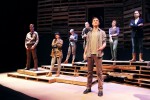Standing on the wooden platforms in The Little Theater, Brette O’Brien, a third-year theater student, runs through the library of characters she has accumulated. She mentally flips between Catherine Connelly, Zackie Salmon, Alison Mears, Juror No. 1 and Judy Shepard.
After weeks of rehearsals, O’Brien can finally speak as Connolly without accidentally talking like any of her other characters. O’Brien said acting as multiple characters was the hardest part about working on “The Laramie Project,” a play presented by the School of Theater, Film and Television’s undergraduate department.
“The Laramie Project” will run Tuesday through Saturday in The Little Theater. The play was written by Moisés Kaufman and originally performed by the Tectonic Theater Project, a New York City-based theater company.
Director and graduate theater student Bryan Puckett took on the play as a thesis for his master of fine arts degree. Since the play has more than 60 characters, Puckett said there are no main actors; however, William Bostwick, a second-year theater student, plays the narrator and O’Brien is one of the actors who has five roles.
“The Laramie Project” is centered on the reactions of residents in Laramie, Wyo., to gay college student Matthew Shepard’s murder in 1998, which Puckett said brought attention to the gay rights movement. The play is made up of segments in which cast members act as Laramie residents and as Tectonic Theater Project members reading their own journals entries.
Residents range from Shepard’s best friend to professors to Baptist ministers of Laramie. Residents declared Shepard’s murder a hate crime, and in 2009, Congress passed the Matthew Shepard and James Byrd, Jr. Hate Crimes Prevention Act.
“This is definitely the largest play I have ever worked on,” Puckett said. “But it was important to do this play because it shows that good can come out of evil.”
Puckett said he wanted to bring this play to UCLA because his high school drama teacher Jonathan Westerberg directed it. This was when Puckett said he became interested in directing.
Wanting to stay faithful to the source material, Puckett said he aimed to be as objective as the Tectonic Theater Project. He didn’t want to linger or promote any one side more than the other.
“What we’re trying to do is not change people’s minds,” Puckett said. “We’re just trying to show the humanity of the situation.”
Puckett cast 17 students for his version, so each person, except the narrator, has to play multiple characters. Actors have to make sure to mentally switch between characters before the next time they get on stage, Puckett said.
To organize this, Puckett said that he needed Rowan Smith, a third-year theater student, as his stage manager. The two worked together last year on “Assume the Worst,” by theater graduate student Jeffrey Baker, and built a strong connection.
Smith said that this play is the most cue-heavy show she has ever done: It includes 270 light cues, 150 sound cues, 51 projection cues and one rail cue.
“I’ve enhanced my stage management ability a lot,” Smith said. “I learned that to keep everything in control I actually have to let go of some of my control. I had to learn to let go some of my responsibilities.”
To pick the right people for this cast, Puckett said he employed a different method for the audition process than he had used before. For the second round of callbacks, Puckett just asked people why they wanted to join the play.
“We wanted people who bring their own story to the show,” Puckett said.
In addition to the audition process, Puckett said the cast members just studied their characters for the first two weeks of rehearsals. O’Brien said she went online and watched videos of her characters because some are still alive.
Puckett said come final rehearsals, he feels confident in the actors’ ability to pull off a successful opening night. While he recognizes that mistakes happen in theater, he believes his crew will do justice to “The Laramie Project.”
“It’s important to show the beginning of how (the gay rights movement) all happened,” Puckett said. “This play is timeless and will serve as a reminder.”
